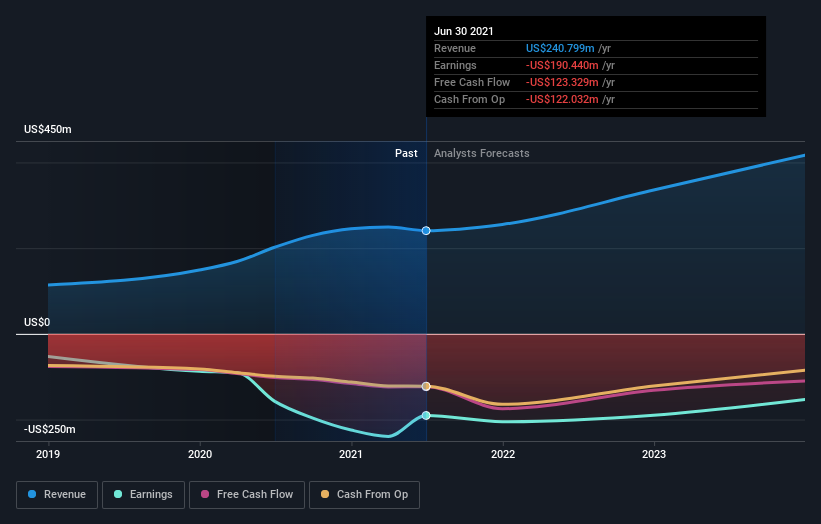American Well (NYSE:AMWL) investors are sitting on a loss of 64% if they invested a year ago
Taking the occasional loss comes part and parcel with investing on the stock market. Anyone who held American Well Corporation (NYSE:AMWL) over the last year knows what a loser feels like. To wit the share price is down 64% in that time. We wouldn't rush to judgement on American Well because we don't have a long term history to look at. The falls have accelerated recently, with the share price down 25% in the last three months.
Now let's have a look at the company's fundamentals, and see if the long term shareholder return has matched the performance of the underlying business.
See our latest analysis for American Well
American Well wasn't profitable in the last twelve months, it is unlikely we'll see a strong correlation between its share price and its earnings per share (EPS). Arguably revenue is our next best option. When a company doesn't make profits, we'd generally expect to see good revenue growth. That's because it's hard to be confident a company will be sustainable if revenue growth is negligible, and it never makes a profit.
In the last year American Well saw its revenue grow by 19%. That's definitely a respectable growth rate. Meanwhile, the share price tanked 64%, suggesting the market had much higher expectations. It is of course possible that the business will still deliver strong growth, it will just take longer than expected to do it. For us it's important to consider when you think a company will become profitable, if you're basing your valuation on revenue.
The company's revenue and earnings (over time) are depicted in the image below (click to see the exact numbers).
American Well is well known by investors, and plenty of clever analysts have tried to predict the future profit levels. If you are thinking of buying or selling American Well stock, you should check out this free report showing analyst consensus estimates for future profits.
A Different Perspective
Given that the market gained 38% in the last year, American Well shareholders might be miffed that they lost 64%. While the aim is to do better than that, it's worth recalling that even great long-term investments sometimes underperform for a year or more. With the stock down 25% over the last three months, the market doesn't seem to believe that the company has solved all its problems. Given the relatively short history of this stock, we'd remain pretty wary until we see some strong business performance. While it is well worth considering the different impacts that market conditions can have on the share price, there are other factors that are even more important. Take risks, for example - American Well has 4 warning signs we think you should be aware of.
Of course American Well may not be the best stock to buy. So you may wish to see this free collection of growth stocks.
Please note, the market returns quoted in this article reflect the market weighted average returns of stocks that currently trade on US exchanges.
This article by Simply Wall St is general in nature. We provide commentary based on historical data and analyst forecasts only using an unbiased methodology and our articles are not intended to be financial advice. It does not constitute a recommendation to buy or sell any stock, and does not take account of your objectives, or your financial situation. We aim to bring you long-term focused analysis driven by fundamental data. Note that our analysis may not factor in the latest price-sensitive company announcements or qualitative material. Simply Wall St has no position in any stocks mentioned.
Have feedback on this article? Concerned about the content? Get in touch with us directly. Alternatively, email editorial-team (at) simplywallst.com.

 Yahoo Finance
Yahoo Finance 
